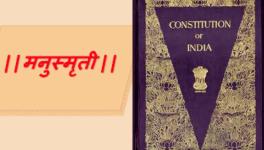UP’s Law Prohibiting Conversion is Unconstitutional and Draconian

Image Courtesy: NDTV
This unique law promulgated by the UP government strives to curb fundamental freedoms guaranteed under Articles 14, 15, 19 and 21 and clamps down brutally on the marriage or cohabitation of couples of different faiths. It provides a fresh platform to institute false and motivated prosecutions and subverts religious and institutional autonomy. It also gives misguided and indoctrinated youth an excuse to resort to mob violence such as seen in cases of cow vigilantism, says MAHALAKSHMI PAVANI.
________
THE recently promulgated Prohibition of Conversion of Religion Ordinance 2020 by the UP government is an absurd and unique law. It calls into question the fundamental freedoms guaranteed under Articles 14, 15, 19 and 21 of the Constitution and whittles down the glorious jurisprudence rendered by constitutional courts where personal liberties and individual autonomy were concerned.
The Ordinance has religious overtones and gives the impression of a state which has clamped down as it is petrified with the harmonious co-existence of people of different faiths. So imperilled does it seem that it is willing to use all the force at its disposal to prevent people of different religions from cohabiting together.
Justice D.Y. Chandrachud in Shafin Jahan vs K.M.Asokan (2018) held: “The choice of a partner whether within or outside marriage lies within the exclusive domain of each individual. Intimacies of marriage lie within a core zone of privacy, which is inviolable….The Constitution guarantees to each individual the right freely to practise, profess and propagate religion.”
Code of Conduct
Reading the provisions of the Ordinance is like going through a code of conduct of an anarchical state which infringes on the liberties of its citizens. This divisive legislation sows the seeds of pugnacity and deepens the cleavage between people of different faiths. It provides a fresh platform to institute false and motivated prosecutions and subverts religious and institutional autonomy. It gives misguided and indoctrinated youth an excuse to resort to mob violence such as seen in cases of cow vigilantism. This bill, many feel, doesn’t deserve judicial scrutiny and is prima facie unlawful.
Article 16 of the Universal Declaration of Human Rights underscores the fundamental importance of marriage: Plus, the right to marry a person of one’s choice is integral to Article 21 of the Constitution which guarantees Right to life. Assertion of choice is an inseparable facet of liberty and dignity. Justice D.Y. Chandrachud in Shafin Jahan vs K.M.Asokan (2018) held: “The Constitution recognises the liberty and autonomy which inheres in each individual. This includes the ability to make decisions on aspects which define one’s personhood and identity. The choice of a partner whether within or outside marriage lies within the exclusive domain of each individual. Intimacies of marriage lie within a core zone of privacy, which is inviolable….The Constitution guarantees to each individual the right freely to practise, profess and propagate religion. Choices of faith and belief as indeed choices in matters of marriage lie within an area where individual autonomy is supreme.”
He added succinctly: “The Constitution exists for believers as well as for agnostics. The Constitution protects the ability of each individual to pursue a way of life or faith to which she or he seeks to adhere. Matters of dress and of food, of ideas and ideologies, of love and partnership, are within the central aspects of identity.” He said that these remedies are available to parties to a marriage for it is they who decide best on whether they should accept each other into a marital tie or continue in that relationship. “Society has no role to play in determining our choice of partners.”
Section 3, in a tacit way, ensures conversion and restricts a person from exercising her/his pre-marital religious status. This, if not done, exposes the couple to the risk of a slew of FIRs that may be filed by the police at the instance of unaffected parties.
Intention Behind the Ordinance
The aims and objectives of this Ordinance make one question the intention behind promulgating it. It reads: “To provide for unlawful conversion from one religion to another by misrepresentation, force undue influence, allurement or any fraudulent means or by marriage and for matters connected therewith and incidental thereto.” This implies that any inter-faith marriage can be questioned by the offended class.
Section 3, in a tacit way, ensures conversion and restricts a person from exercising her/his pre-marital religious status. This, if not done, exposes the couple to the risk of a slew of FIRs that may be filed by the police at the instance of unaffected parties. But a person may not be charged with the provisions of this Ordinance if she/he reconverts back to her/his original religion.
The definition of “allurement” in the Ordinance includes any gift, gratification in cash or kind, “employment or admission into a reputed school run by a religious body”. This poses a different problem–if a person marries someone of different faith and wishes to continue studying or is employed in an institution connected to the faith of the partner’s leanings, their union can be doubted.
The definition of “unlawful conversion” is also blurred. It means “any conversion not in accordance with the law of the land”. It doesn’t talk about any specific corresponding law either in the IPC or other state or central statutes which defines conversion. The process of “lawful conversion”, as prescribed in the Ordinance, requires the person concerned to make a declaration to a magistrate 60 days in advance. The declaration would include that such ceremony will happen with the free will and consent of the person. It also requires the priest or religious functionary to submit a declaration to the effect that he would be undertaking the conversion ceremony.
The process of “lawful conversion”, as prescribed in the Ordinance, requires the person concerned to make a declaration to a magistrate 60 days in advance. The declaration would include that such ceremony will happen with the free will and consent of the person.
Inquiry by DM
There is also an independent application of mind clause which demands that the district magistrate conduct an inquiry through the police about the veracity of the declarations submitted to find out “real intention, purpose and cause” of such a conversion. If the person who is ready to convert out of his own free consent and without any duress does not comply with such a declaration, he can be incarcerated for up to three years. Furthermore, the priest who fails to provide details of such a conversion before the district magistrate can also be jailed for up to five years.
I am reminded of the saying: “Miya, biwi raazi, toh kya karega qazi (If the husband and wife are willing, what can the priest do?)”. Except that now, even the qazi will be arrested for suppression of facts. It is startling that the Ordinance does not even address these issues and instead, seeks to turn two consenting adults, who have professed their love for each other, into criminals merely because they belong to different religions and seek to convert into the religion of their partner. Any offence under this law is cognisable and non-bailable.
Likewise, any person(s) who is not even remotely connected to the couple can object to any inter-faith marriage and file an FIR against them or cohabiting partners on a mere assumption of an intent to forcefully convert a person to another religion. This is not only preposterous but dangerous. In such cases, the offended person, more often than not, would be an extremist group or one of the self-appointed bodies which harp on bigotry and are deeply entrenched in a patriarchal mindset.
Another aspect is that this law seeks to directly curb the autonomy of institutions. It does so by first coining the provision in the most unattached terms so that the net has a wide reach. Any institution (especially NGOs or community help groups) which protects a bona fide couple from illegal prosecution, not to mention the incessant harassment by the police, would be penalised by the State and their licenses and registrations to operate would be cancelled. This goes along with suspension of any financial grants or state funding.
Any person(s) who is not even remotely connected to the couple can object to any inter-faith marriage and file an FIR against them or cohabiting partners on a mere assumption of an intent to forcefully convert a person to another religion. This is not only preposterous but dangerous.
High Courts’ Laudable Efforts
However, one has to commend the dauntless efforts of the High Courts of Allahabad, Karnataka and Calcutta which have in no ambiguous terms held (after enactment of this Ordinance) that marriage or choosing a partner of one’s choice is an unfettered right of an individual guaranteed under the Constitution. And the State has no right to dictate the choice of a person in matters of religious orientation and marital decisions.
The Calcutta High Court recently remarked: “If an adult marries as per her choice and decides to convert and not return to her paternal house, there can be no interference in the matter.” This Ordinance, therefore, violates a number of judicial precedents on personal liberty and individual freedoms that have been rendered by the Supreme Court and other High Courts.
It is only a matter of time before this unconstitutional and draconian Ordinance is struck down by our fiercely independent judiciary that strives to uphold the personal liberty of an individual, as well as the rule of law.
(Mahalakshmi Pavani is a Senior Advocate in the Supreme Court of India. The views expressed are personal.)
The article was originally published in The Leaflet.
Get the latest reports & analysis with people's perspective on Protests, movements & deep analytical videos, discussions of the current affairs in your Telegram app. Subscribe to NewsClick's Telegram channel & get Real-Time updates on stories, as they get published on our website.
























